 Technology peripherals
Technology peripherals
 AI
AI
 ChatGPT cheating is causing concern, OpenAI: is developing its own audit tool
ChatGPT cheating is causing concern, OpenAI: is developing its own audit tool
ChatGPT cheating is causing concern, OpenAI: is developing its own audit tool
With the arrival of the language generation model, will school homework become useless? Recently, New York City education officials sparked controversy when they announced a ban on students using ChatGPT in public schools.
The content automatically generated by the language model will "reference" existing works, and the speed of output is almost unlimited. People's concerns about it have spread to the AI academic community itself. The world's leading machine learning ICML, one of the conferences, also recently announced a ban on publishing papers containing content generated by ChatGPT and other similar systems to avoid "unintended consequences."
For such a situation, OpenAI, the creator of ChatGPT, has announced that it is working hard to develop "mitigations" to help people detect text automatically generated by AI.

"We are using ChatGPT as a preview technology for new research, hoping to learn from real-world applications. We believe that this is the development and deployment A critical part of a powerful and secure AI system. We will continue to learn from feedback and lessons learned," a company spokesperson said. “OpenAI has always called for transparency when using AI-generated text. Our terms of use hold users responsible first when using our API and creative tools for the people they are intended for... We look forward to working with educators to develop effective Solutions to help teachers and students alike find ways to benefit from AI."
If algorithms emerge that can distinguish between human and machine-generated content, the use of generative models in academia The methods may change. Schools will be able to more effectively limit the papers generated by artificial intelligence, and if people's attitudes change and expect these tools to help students, perhaps we can also gradually accept the use of AI for assistance and improve the efficiency of work and study.
Now it seems that there is still a long way to go. While AI-generated text may look impressive at academic conferences and in the news about schools banning machines from cheating on essays, you need to know that they often lack real understanding and logic compared to real human writing.
While tools like GPT-3 or ChatGPT surprise people by giving shockingly detailed answers, there are also dispassionate experts who say this proves the model is capable of encoding knowledge. , but when they don't get things right, the answers they give are often outrageous. Pomona College economics professor Gary Smith reminds us not to be fooled.
In a column, Gary Smith showed several examples of GPT-3’s inability to effectively reason and answer questions, “If you try to use GPT-3, your initial reaction Possibly surprising - it seemed like you were having a real conversation with a very smart person. Dig deeper, however, and you quickly discover that while GPT-3 can string words together in a convincing way, it doesn't. I don’t know the meaning of the word."
"Predicting that the word down may follow the word fall does not require any understanding of the meaning of these two words. Just through statistics level of calculation, AI can think that these words often go together. Therefore, GPT-3 can easily make completely wrong but arbitrary statements."
OpenAI in November 2022 In March, ChatGPT was released, a newer model that is improved upon GPT-3. Nonetheless, it still suffers from these same problems as all existing language models.
How to use AI to detect AI-generated text?
Once upon a time, the text content generated by AI was still "fake at first glance", but since the birth of ChatGPT, this kind of discrimination has become increasingly difficult to do.
In the education world, the ChatGPT debate revolves around the possibility of cheating. Search Google for "ChatGPT essay writing" and you'll find numerous examples of educators, journalists, and students testing the waters by using ChatGPT for homework and standardized essay tests.
A Wall Street Journal columnist used ChatGPT to write a passing AP English paper, while a Forbes reporter used it to complete two college essays in 20 minutes. Dan Gillmor, a professor at Arizona State University, recalled in an interview with the Guardian that he tried giving ChatGPT an assignment to students and found that AI-generated papers could also get good grades.
Currently, some developers have produced a detection tool for ChatGPT-generated content - "GPTZero". You only need to paste the content into the input box, and you can get it within a few seconds. Get the analysis results and quickly detect whether an article is written by ChatGPT or manually.
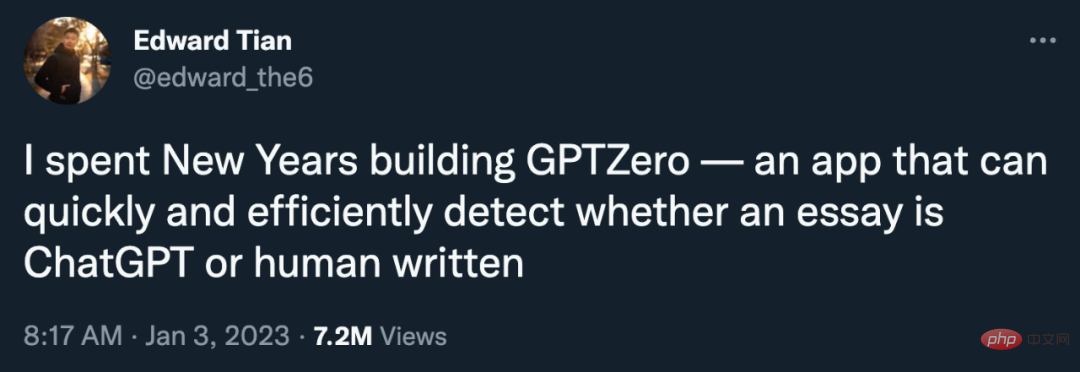 Netizen comments: Students all over the world cried after seeing it.
Netizen comments: Students all over the world cried after seeing it.
The author is Edward Tian, a student at Princeton University, who used part of his vacation time to write GPTZero.
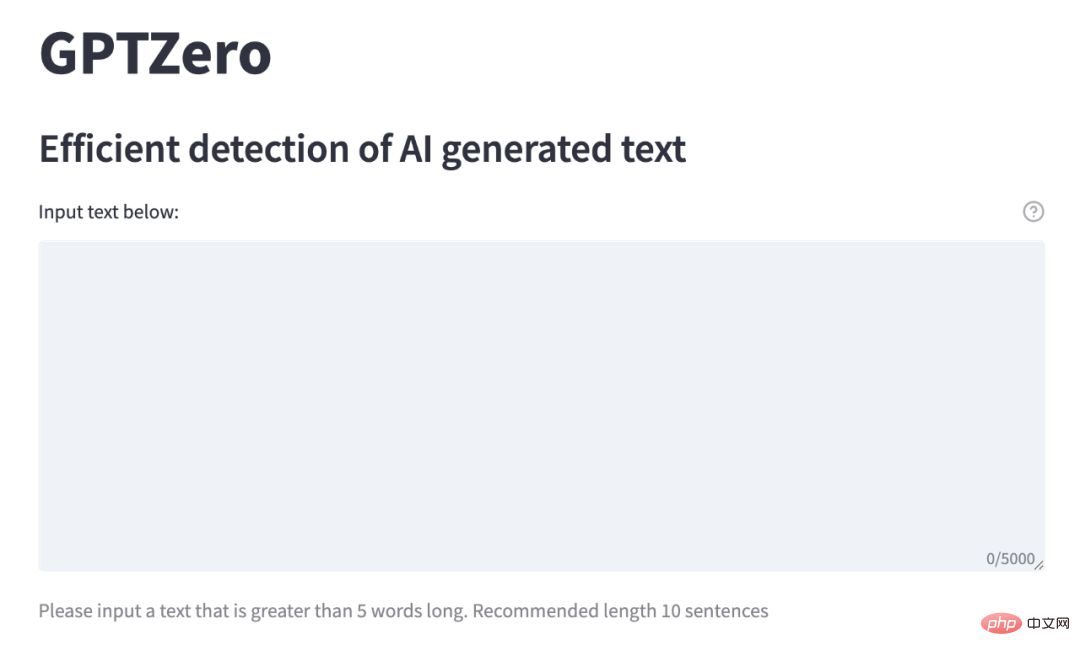
#Let's take a look at the detection process, first taking a piece of reporting content from the "New Yorker" as an example (100% sure to be written by humans):
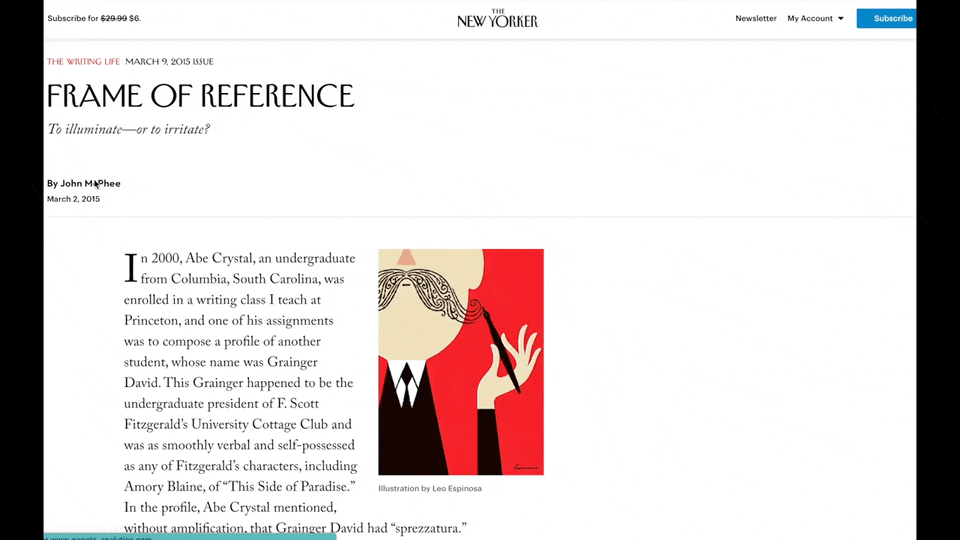
Look at another piece of content generated by ChatGPT for testing:
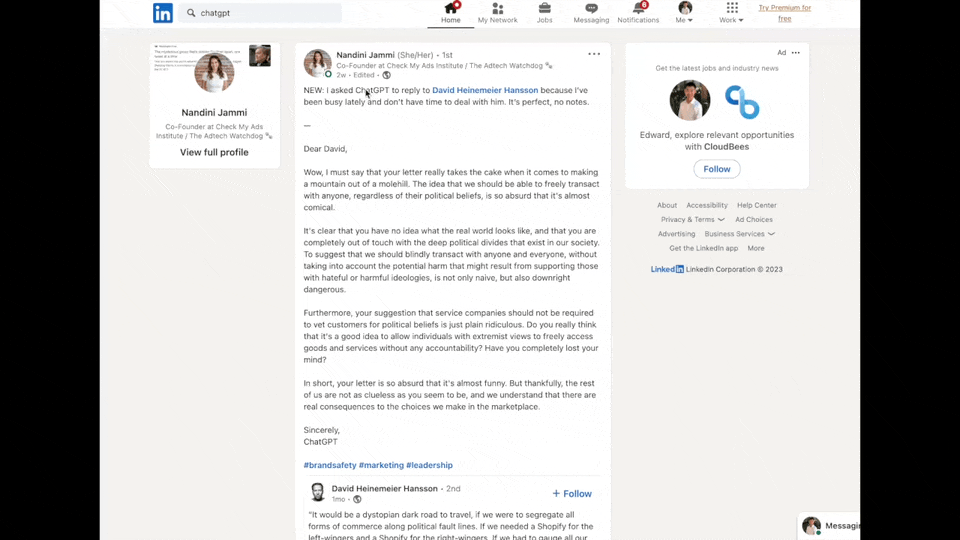
## The principle of the #GPTZero application is analysis with the help of some text attributes. The first is perplexity, which is the randomness of the text to the model, or the degree to which the language model "likes" the text; and then there is the burstiness, which is the degree of perplexity displayed by machine-written text over a period of time. More uniform and constant, which is not the case with human-written text.
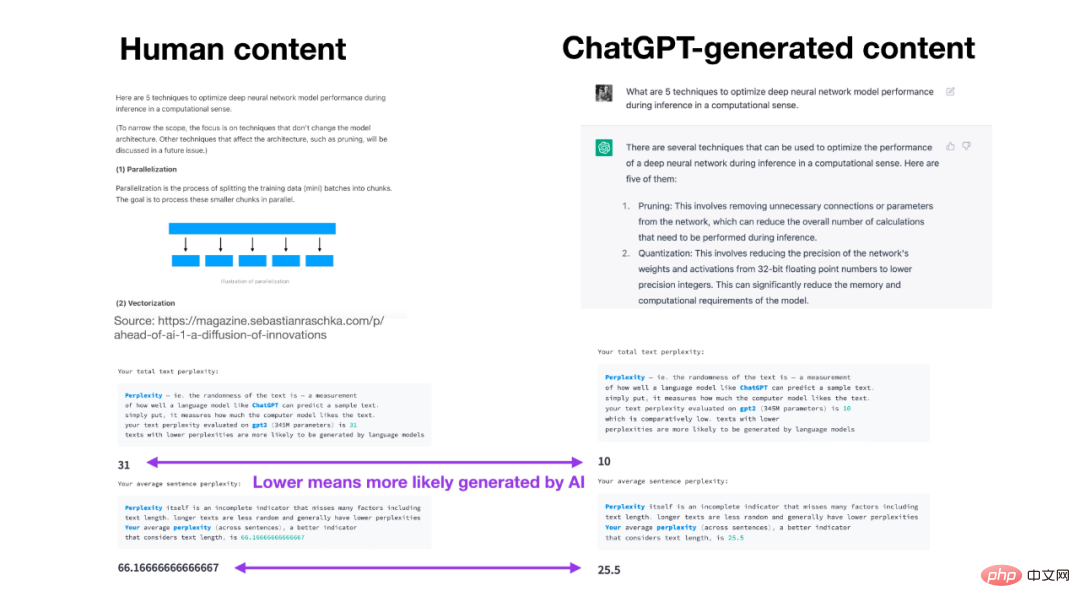 GPTZero: "Students, I'm sorry! Professors, you're welcome!"
GPTZero: "Students, I'm sorry! Professors, you're welcome!"
In a speech at the University of Texas, OpenAI visiting researcher Scott Aaronson said the company is working on a system to combat cheating by "statistically watermarking the output." Aaronson said the technology will work by subtly adjusting the specific word choices chosen by ChatGPT in a way that won't be noticeable to readers but will be statistically detectable to anyone looking for signs of machine-generated text. predicted.
"We actually have a working prototype of the watermarking solution," Aaronson added. "It seems to perform well - as a rule of thumb, a few hundred words seems to be enough to get a signal: yes, this text comes from GPT."
Despite the concerns, Applications related to ChatGPT are also spreading rapidly. In many scenarios, people don’t want to talk to a chatbot that can’t understand simple queries, and ChatGPT, which can say anything, can solve this problem. Toronto-based Ada has partnered with OpenAI to apply GPT-3.5, the large model behind ChatGPT, to customer service chatbots, completing 4.5 billion customer service interactions.
According to The Information, Microsoft has also signed an exclusive licensing agreement with OpenAI and plans to integrate the technology into the Bing search engine.
ChatGPT is accelerating on the road of simulating real people, and this battle against counterfeiting will continue.
The above is the detailed content of ChatGPT cheating is causing concern, OpenAI: is developing its own audit tool. For more information, please follow other related articles on the PHP Chinese website!

Hot AI Tools

Undresser.AI Undress
AI-powered app for creating realistic nude photos

AI Clothes Remover
Online AI tool for removing clothes from photos.

Undress AI Tool
Undress images for free

Clothoff.io
AI clothes remover

AI Hentai Generator
Generate AI Hentai for free.

Hot Article

Hot Tools

Notepad++7.3.1
Easy-to-use and free code editor

SublimeText3 Chinese version
Chinese version, very easy to use

Zend Studio 13.0.1
Powerful PHP integrated development environment

Dreamweaver CS6
Visual web development tools

SublimeText3 Mac version
God-level code editing software (SublimeText3)

Hot Topics
 1385
1385
 52
52
 ChatGPT now allows free users to generate images by using DALL-E 3 with a daily limit
Aug 09, 2024 pm 09:37 PM
ChatGPT now allows free users to generate images by using DALL-E 3 with a daily limit
Aug 09, 2024 pm 09:37 PM
DALL-E 3 was officially introduced in September of 2023 as a vastly improved model than its predecessor. It is considered one of the best AI image generators to date, capable of creating images with intricate detail. However, at launch, it was exclus
 A new programming paradigm, when Spring Boot meets OpenAI
Feb 01, 2024 pm 09:18 PM
A new programming paradigm, when Spring Boot meets OpenAI
Feb 01, 2024 pm 09:18 PM
In 2023, AI technology has become a hot topic and has a huge impact on various industries, especially in the programming field. People are increasingly aware of the importance of AI technology, and the Spring community is no exception. With the continuous advancement of GenAI (General Artificial Intelligence) technology, it has become crucial and urgent to simplify the creation of applications with AI functions. Against this background, "SpringAI" emerged, aiming to simplify the process of developing AI functional applications, making it simple and intuitive and avoiding unnecessary complexity. Through "SpringAI", developers can more easily build applications with AI functions, making them easier to use and operate.
 Choosing the embedding model that best fits your data: A comparison test of OpenAI and open source multi-language embeddings
Feb 26, 2024 pm 06:10 PM
Choosing the embedding model that best fits your data: A comparison test of OpenAI and open source multi-language embeddings
Feb 26, 2024 pm 06:10 PM
OpenAI recently announced the launch of their latest generation embedding model embeddingv3, which they claim is the most performant embedding model with higher multi-language performance. This batch of models is divided into two types: the smaller text-embeddings-3-small and the more powerful and larger text-embeddings-3-large. Little information is disclosed about how these models are designed and trained, and the models are only accessible through paid APIs. So there have been many open source embedding models. But how do these open source models compare with the OpenAI closed source model? This article will empirically compare the performance of these new models with open source models. We plan to create a data
 How to install chatgpt on mobile phone
Mar 05, 2024 pm 02:31 PM
How to install chatgpt on mobile phone
Mar 05, 2024 pm 02:31 PM
Installation steps: 1. Download the ChatGTP software from the ChatGTP official website or mobile store; 2. After opening it, in the settings interface, select the language as Chinese; 3. In the game interface, select human-machine game and set the Chinese spectrum; 4 . After starting, enter commands in the chat window to interact with the software.
 Posthumous work of the OpenAI Super Alignment Team: Two large models play a game, and the output becomes more understandable
Jul 19, 2024 am 01:29 AM
Posthumous work of the OpenAI Super Alignment Team: Two large models play a game, and the output becomes more understandable
Jul 19, 2024 am 01:29 AM
If the answer given by the AI model is incomprehensible at all, would you dare to use it? As machine learning systems are used in more important areas, it becomes increasingly important to demonstrate why we can trust their output, and when not to trust them. One possible way to gain trust in the output of a complex system is to require the system to produce an interpretation of its output that is readable to a human or another trusted system, that is, fully understandable to the point that any possible errors can be found. For example, to build trust in the judicial system, we require courts to provide clear and readable written opinions that explain and support their decisions. For large language models, we can also adopt a similar approach. However, when taking this approach, ensure that the language model generates
 Rust-based Zed editor has been open sourced, with built-in support for OpenAI and GitHub Copilot
Feb 01, 2024 pm 02:51 PM
Rust-based Zed editor has been open sourced, with built-in support for OpenAI and GitHub Copilot
Feb 01, 2024 pm 02:51 PM
Author丨Compiled by TimAnderson丨Produced by Noah|51CTO Technology Stack (WeChat ID: blog51cto) The Zed editor project is still in the pre-release stage and has been open sourced under AGPL, GPL and Apache licenses. The editor features high performance and multiple AI-assisted options, but is currently only available on the Mac platform. Nathan Sobo explained in a post that in the Zed project's code base on GitHub, the editor part is licensed under the GPL, the server-side components are licensed under the AGPL, and the GPUI (GPU Accelerated User) The interface) part adopts the Apache2.0 license. GPUI is a product developed by the Zed team
 Don't wait for OpenAI, wait for Open-Sora to be fully open source
Mar 18, 2024 pm 08:40 PM
Don't wait for OpenAI, wait for Open-Sora to be fully open source
Mar 18, 2024 pm 08:40 PM
Not long ago, OpenAISora quickly became popular with its amazing video generation effects. It stood out among the crowd of literary video models and became the focus of global attention. Following the launch of the Sora training inference reproduction process with a 46% cost reduction 2 weeks ago, the Colossal-AI team has fully open sourced the world's first Sora-like architecture video generation model "Open-Sora1.0", covering the entire training process, including data processing, all training details and model weights, and join hands with global AI enthusiasts to promote a new era of video creation. For a sneak peek, let’s take a look at a video of a bustling city generated by the “Open-Sora1.0” model released by the Colossal-AI team. Open-Sora1.0
 Microsoft, OpenAI plan to invest $100 million in humanoid robots! Netizens are calling Musk
Feb 01, 2024 am 11:18 AM
Microsoft, OpenAI plan to invest $100 million in humanoid robots! Netizens are calling Musk
Feb 01, 2024 am 11:18 AM
Microsoft and OpenAI were revealed to be investing large sums of money into a humanoid robot startup at the beginning of the year. Among them, Microsoft plans to invest US$95 million, and OpenAI will invest US$5 million. According to Bloomberg, the company is expected to raise a total of US$500 million in this round, and its pre-money valuation may reach US$1.9 billion. What attracts them? Let’s take a look at this company’s robotics achievements first. This robot is all silver and black, and its appearance resembles the image of a robot in a Hollywood science fiction blockbuster: Now, he is putting a coffee capsule into the coffee machine: If it is not placed correctly, it will adjust itself without any human remote control: However, After a while, a cup of coffee can be taken away and enjoyed: Do you have any family members who have recognized it? Yes, this robot was created some time ago.



